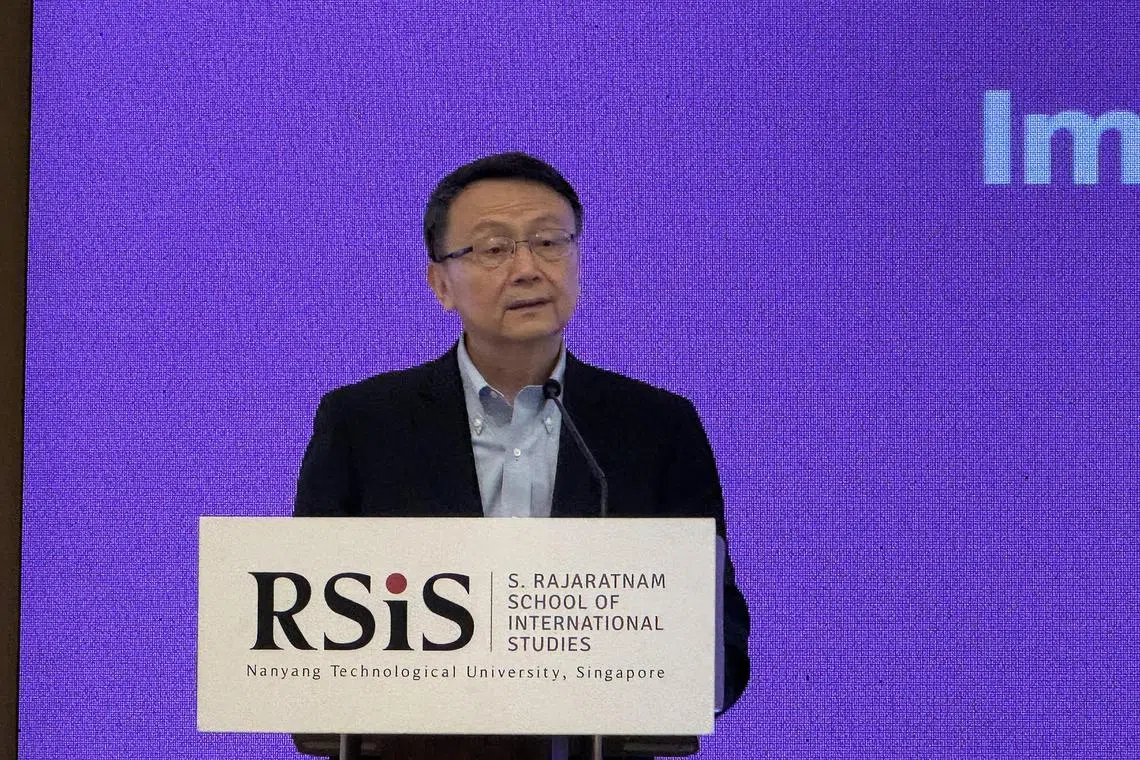China does not prefer Donald Trump, says leading Chinese scholar on White House race
Sign up now: Get ST's newsletters delivered to your inbox

Professor Jia Qingguo said Beijing typically prefers the presidential candidate from the incumbent ruling party to win.
ST PHOTO: YEW LUN TIAN
SINGAPORE - If Donald Trump returns to the White House, US ties with Beijing are expected to turn rockier because of his mercurial personality as well as the policy discontinuity that typically comes with a change in American government, said one of China’s foremost US watchers.
Speaking in Singapore on Oct 16, visiting professor Jia Qingguo, a former dean of Peking University’s School of International Studies, described Trump as an “unpredictable, emotional and ethics-lacking person”.
When Trump was US President from 2017 to 2021, he would profess his admiration for Chinese President Xi Jinping
“If Trump wins, then we’ll see a repeat of what happened in China and the US during his last term in office: A race to the bottom, high tariffs and very provocative actions like taking a phone call from (former Taiwan president) Tsai Ing-wen or saying that the US Secretary of State will visit Taiwan,” he said during the S.T. Lee Distinguished Annual Lecture organised by the S. Rajaratnam School of International Studies.
Prof Jia, who is a political adviser to the Chinese government, said Beijing typically prefers the presidential candidate from the incumbent ruling party to win because the candidate from the opposition party tends to claim he or she is tougher on China and may have to live up to campaign promises after winning.
There is also the issue of policy continuity when the keys to the White House are handed over to another political party, he said.
In their haste to secure new jobs, or because it is politically expedient for them to do so, incumbent officials may not always conduct thorough briefings with their successors, he added. Some tacit understandings that China had struck with the previous US administration could get lost in the process, which would then require a year or two for discussions to regain momentum, he said.
Some analysts have posited that China would prefer Trump because Democratic candidate Kamala Harris is expected to rally allies
Prof Jia disagreed, pointing to Trump’s inclination to unilateralism as a downside for China. Under Trump, Washington could devise its Beijing strategy without being constrained by the concerns of its allies, who may not want to take as aggressive a stance against China as the US.
He added that China typically did not prefer one party over another in past US elections, as each party had its pros and cons. The Republicans are traditionally more pro-trade but more hawkish on security and Taiwan, while the opposite goes for the Democrats.
But the old assumptions have changed. The Trump administration was harsh on trade, while the current Biden administration is no softer on security issues involving China.
“China clearly has a preference this time: We do not prefer Donald Trump,” he said.
He anticipates that if Ms Harris were to win, there would be policy continuity in the foreseeable future. In this case, China should continue and even expand its engagements with the US to manage differences and cooperate on global challenges, he said.
But Prof Jia anticipates that a Trump win would lead to an acceleration in trade and tech decoupling between the world’s two largest economies. China should then speed up its military modernisation to prepare for potential US challenges to Beijing’s core interests, such as Taiwan, he said.
But no matter which candidate wins, he thinks China should avoid getting dragged into unnecessary military conflicts and not be too sensitive to criticisms about its handling of the South China Sea or Taiwan issue.
“A knee-jerk response to criticism is a sign of weakness rather than strength,” he said.
Speaking to The Straits Times after the talk, Prof Jia said that Chinese leaders should “take the lead” in deciding how to respond to criticism, and not be swayed by nationalistic public sentiments.
“China‘s rise has been so fast that even the Chinese people themselves have not fully adapted to it. That’s why many people feel hurt when other countries criticise China because they still think of themselves and China as weak.”
Prof Jia regularly gives inputs to the Chinese government in his capacity as a member of the Chinese People’s Political Consultative Conference standing committee, an important political advisory body.
Four years ago, he won two bottles of Chinese liquor Maotai in a bet that Mr Joe Biden would beat Trump to become the next US president. This time, his money is still on the Democratic candidate, Ms Harris.
Prof Jia said that while polls show that both candidates are neck and neck for the Nov 5 election, undecided voters are more likely to reject Trump because “American people likely won’t make the same mistake twice”.


